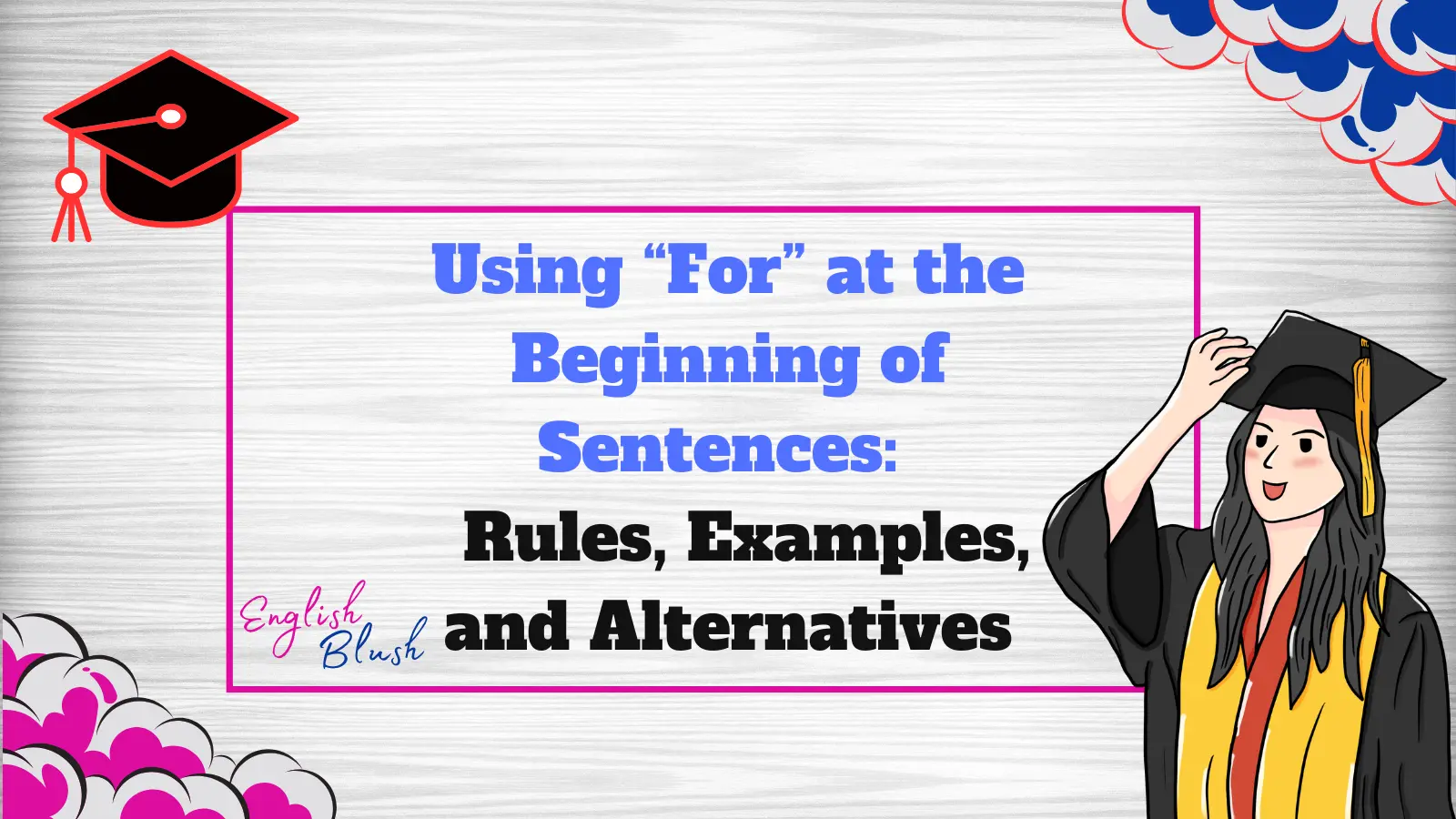Starting a sentence with “For” can seem odd to many, especially if they were taught it’s incorrect in school. But is it? In this article, we’ll explain whether using “For” at the beginning of a sentence is correct. We’ll explore when it’s appropriate, how to use it in formal and informal writing, and offer examples and alternatives. Let’s dive in.
Can You Start a Sentence with “For”?
Yes, you can start a sentence with “For.” This word is a coordinating conjunction, like “and,” “but,” or “so.” It connects ideas and often introduces a reason for something said earlier. While some believe it’s improper to start a sentence with conjunctions, it’s widely accepted in both modern formal and informal writing.
Starting with “For” adds variety to sentences and makes writing smoother, especially when explaining reasons or purposes.
When to Use “For” at the Beginning of a Sentence
Using “For” at the start of a sentence works best in these situations:
1. To Give a Reason
You might want to explain why something happened. Starting with “For” creates a natural, flowing explanation.
Example:
- She stayed late at work. For she wanted to finish the project on time.
This use shows a clear cause-and-effect relationship.
2. To Sound More Formal or Literary
In older texts or formal writing, you’ll see “For” used for a dramatic or elegant tone.
Example:
- For they knew not the dangers ahead, they marched bravely into the night.
While this style might feel old-fashioned, it’s useful in literature, speeches, or creative writing.
Rules for Using “For” Correctly
If you want to use “For” at the start of a sentence, follow these guidelines to ensure clarity:
Rule 1: Complete the Thought
A sentence that begins with “For” should be a full sentence, meaning it needs a subject and a verb.
Correct Example:
- I couldn’t go to the concert. For I had to finish an important assignment.
Incorrect Example:
- For being late. (This is a fragment, not a complete sentence.)
Rule 2: Ensure Logical Connection
The part that comes after “For” must logically connect to the statement before.
Correct Example:
- She didn’t respond to my messages. For she had left her phone at home.
Incorrect Example:
- She was feeling tired. For it was raining. (The ideas aren’t clearly connected.)
Alternatives to Starting a Sentence with “For”
While “For” works well, you may want to avoid repetition or add variety. Here are some alternatives:
1. Replace “For” with “Because” or “As”
Sometimes, swapping “For” with “because” or “as” makes the sentence sound more natural.
Examples:
- I couldn’t attend the meeting. Because I was feeling unwell.
- She left early. As she had other plans for the evening.
2. Use “Due to” or “Since”
These are great for explaining reasons in formal contexts.
Examples:
- The event was postponed due to bad weather.
- I skipped lunch, since I wasn’t hungry.
3. Rephrase the Sentence
You can adjust the sentence structure to make “For” unnecessary.
Example:
- Instead of: I stayed up late. For I had a deadline to meet.
- Write: I stayed up late because I had a deadline to meet.
Using “For” in Formal vs. Informal Writing
In Formal Writing
Using “For” in formal writing can be effective, especially when aiming for a serious tone. However, overuse may make your writing sound stiff.
Formal Example:
- He refused the offer. For he believed it wouldn’t benefit the company.
In Informal Writing
In casual texts or conversations, “For” can feel poetic or old-fashioned. It’s less common but still acceptable.
Informal Example:
- I skipped dinner. For I wasn’t that hungry.
If it feels unnatural, stick to simpler alternatives like “because.”
Examples of “For” at the Beginning of Sentences
Here are more examples to help you understand how to use “For”:
- She couldn’t join the hike. For she had a twisted ankle.
- The library was unusually crowded. For it was the first week of exams.
- He didn’t apologize. For he didn’t believe he had done anything wrong.
- For we had seen the results, we decided to revise our plans.
Why People Hesitate to Start Sentences with “For”
The belief that it’s wrong to start a sentence with “For” comes from outdated grammar rules. Traditionally, teachers discouraged starting sentences with coordinating conjunctions like “and,” “but,” or “for” to avoid fragments. Today, these rules are more relaxed, as long as your writing is clear and grammatically correct.
Tips to Avoid Overusing “For”
- Mix Sentence Styles: Don’t start too many sentences with “For.” Use other words or combine ideas for variety.
- Read Aloud: If starting with “For” sounds awkward, rephrase the sentence.
- Know Your Audience: In formal writing, stick to “because,” “as,” or other alternatives when needed.
Conclusion
Starting a sentence with “For” isn’t wrong. It’s a great way to connect ideas, explain reasons, or add a formal touch to your writing. While it’s more common in literary or formal contexts, it can work in casual writing if used thoughtfully. Remember, clarity and readability are key. If starting with “For” doesn’t fit, try the alternatives mentioned above to keep your writing smooth and effective.





